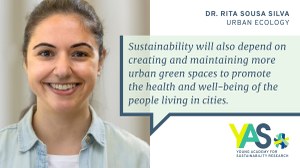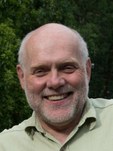Forest Ecology: A longstanding area of research answers questions of the future
Meet the people behind the research projects! In our Faces of FRIAS series we introduce you to current and former Fellows of our institute. In this interview, Prof. Dr. Klaus Puettmann, from Oregon State University, and Dr. Rita Sousa-Silva, from the FRIAS, explain what topics the scientific community is currently dealing with - and what challenges the discipline aims to solve
What is forest ecology about?
Prof. Dr. Klaus Puettmann: In simplified terms, it explores the interrelation between trees, plants, animals and other species to better understand the ecological processes within the forest and their functions.

Dr. Rita Sousa-Silva: On the other hand, my area of research is that of urban forest ecology where the focus is on the interrelation between humans and city forests. To examine these interactions, this field of research borrows concepts from forest ecology. The same goes for when we study the maintenance, management and protection of city forests as well as the relationships amongst trees and between various elements of the urban environment.
Forest ecology has a long-standing tradition in Germany. What is driving the discipline today?
Puettmann: The central themes are the global climate impacts and the question to what extent forest ecosystems can adapt to these processes. We are working hard to make forests more resilient. After all, this is the only way they can provide the ecosystem services expected of them - and which are essential for humans - in the long term.
Sousa-Silva: Society changing has altered the expectations towards the forest. In the past, the focus was put purely on the forest as a useful area of land for timber production, but today it is also assumed to be a habitat, place of relaxation, and partner in the fight against climate change. And, last but not least, to make the cities greener. This raises the question of what the forest of the future will have to look like in order to achieve this balancing act - whether in a natural or urban environment.
How do you contribute to answer these questions of the future?
Puettmann: As a silviculturist, I study, among other things, how monocultures can be converted into diversified and thus more stress-resistant forests. I am interested in which aspects of forest development need to be controlled by humans and which do not. For example, I fear that natural forest development alone cannot counteract climate impacts because the climate is changing faster than trees can adapt. That's why I'm also conducting experiments to find out which measures can be used to make trees, as well as the ecosystem as a whole, more adaptable.
Sousa-Silva: With the increasing urbanization, we are simultaneously becoming more dependent on trees and the benefits they provide. That's why many cities are committed to continue planting trees. Among other things, I am investigating which locations help trees develop their full potential and how trees contribute to our well-being. For example, it's been proven that we're less stressed when we're near them. And because they provide shade and cooling, they can also contribute positively to public health during extreme heat waves.
Today, forest ecology combines several disciplines. What does this mean for interdisciplinary communication?
Sousa-Silva: When working with researchers and stakeholders from a wide variety of sectors - whether that be from administration, health care or the social sciences - it often happens that we find ourselves on different levels of understanding and use different terms for the same concept. In these situations, it helps me to be open to other formulations and to understand that not everyone can know everything.
Puettmann: The interdisciplinary exchange has become more intensive. Offering broadly structured courses of study and interdisciplinary projects contributes to this, as does the option of quickly and easily reading up on current topics in other disciplines via services such as Google Scholar. Since this option is used a lot, I think it is essential that publications are well keyworded so that they can be found online more quickly, especially by scientists from other disciplines.
This interview was conducted by Kristin Schwarz and it was translated by Lilly Kanthak.





